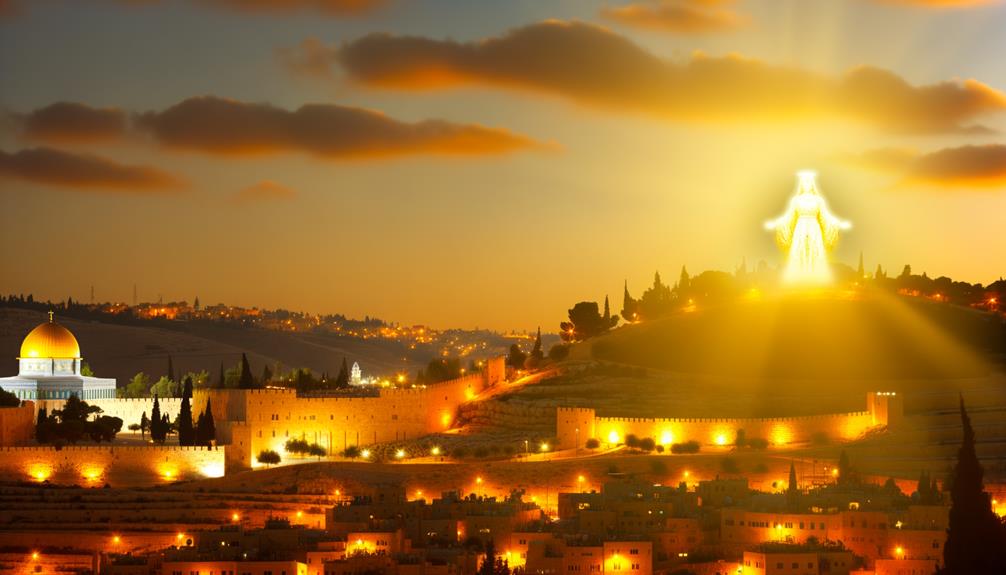Bible Names for God and Meaning: Majesty and Attributes
The Bible presents a rich tapestry of names for God, each elucidating distinct facets of His essence and interaction with humanity. *Elohim* conveys a majestic plurality, highlighting God’s supreme creative authority.
*Jehovah Jireh* translates to “The Lord Will Provide,” underscoring divine provision and covenantal trust exemplified in Abraham’s story. *Adonai* denotes lordship and sovereign authority, used reverentially in worship.
*El Shaddai*, meaning “God Almighty,” emphasizes omnipotence and nurturing sufficiency. *Yahweh*, the most sacred name, signifies “I AM WHO I AM,” reflecting God’s eternal, unchanging nature.
Each name invites a deeper understanding of divine attributes.

Bible Names for God and Their Meanings: Understanding God’s Nature and Attributes
| Name | Meaning |
|---|---|
| Yahweh (Jehovah) | “I AM WHO I AM” (Exodus 3:14) – God’s eternal, self-existent nature and unchanging character. |
| Elohim | “God” (Genesis 1:1) – Reflects God’s power and authority as the Creator of the universe. |
| Adonai | “Lord” (Psalm 8:1) – Represents God’s sovereignty and mastership over all creation. |
| El Shaddai | “God Almighty” (Genesis 17:1) – Emphasizes God’s ultimate power and sufficiency. |
| Jehovah Jireh | “The Lord Will Provide” (Genesis 22:14) – Highlights God’s provision and faithfulness. |
| Jehovah Rapha | “The Lord Who Heals” (Exodus 15:26) – Signifies God’s power to heal physically and spiritually. |
| Jehovah Nissi | “The Lord Is My Banner” (Exodus 17:15) – Symbolizes God’s protection and victory. |
| Jehovah Shalom | “The Lord Is Peace” (Judges 6:24) – Reflects God’s ability to bring peace and wholeness. |
| El Roi | “The God Who Sees Me” (Genesis 16:13) – Acknowledges God’s awareness and care for individuals. |
| Jehovah Tsidkenu | “The Lord Our Righteousness” (Jeremiah 23:6) – Points to God’s righteousness and justice. |
| Jehovah Sabaoth | “The Lord of Hosts” (1 Samuel 1:3) – Refers to God’s command over the heavenly armies. |
| Immanuel | “God With Us” (Isaiah 7:14, Matthew 1:23) – Reveals God’s presence with humanity through Christ. |
Elohim

‘Elohim,’ a term frequently encountered in the Hebrew Bible, is a plural noun that is used to refer to the singular concept of God, encapsulating the complexity and multifaceted nature of the divine in the Judeo-Christian tradition.
The linguistic plurality of ‘Elohim’ has intrigued scholars, suggesting a majestic plurality or a supreme, all-encompassing entity. Despite its plural form, ‘Elohim’ is often paired with singular verbs and adjectives, affirming the monotheistic essence of the tradition.
This duality symbolizes the vastness and incomprehensibility of God’s nature, encompassing various divine attributes within a singular entity.
Additionally, ‘Elohim’ is used to denote God’s role as the supreme creator and sovereign authority, thereby reinforcing the theological assertion of God’s omnipotence and omnipresence.
Jehovah Jireh

The term ‘Jehovah Jireh,’ which translates to ‘The Lord Will Provide,’ is profoundly rooted in the narrative of Abraham’s near-sacrifice of Isaac, illustrating a pivotal moment of divine provision and faith in the Hebrew Bible.
This name of God is first mentioned in Genesis 22:14, where Abraham names the place after God provides a ram as a substitute sacrifice.
Theologically, ‘Jehovah Jireh’ underscores the belief that God anticipates and meets the needs of His faithful, often in ways that surpass human understanding.
It symbolizes a deep, covenantal trust, reflecting an essential aspect of God’s character as a provider.
This appellation has since been interpreted as a reflection of God’s omniscience and benevolence throughout biblical exegesis.
Adonai

In Hebrew tradition, the term ‘Adonai‘ is a revered title for God, denoting His lordship and sovereign authority over all creation.
Derived from the Hebrew root ‘Adon,’ meaning ‘lord’ or ‘master,’ ‘Adonai’ emphasizes God’s supreme power and governance.
It is often used in the context of prayer and worship to acknowledge God’s ultimate control and guidance.
The usage of ‘Adonai’ also reflects a deep sense of respect and reverence, as it substitutes the Tetragrammaton (YHWH) in spoken language to avoid profaning the sacred name of God.
This title underscores the relationship between the divine and the faithful, highlighting God as the ultimate ruler who is both just and compassionate.
El Shaddai

El Shaddai, a potent name for God found in the Hebrew Bible, signifies God’s almighty power and sufficiency, often translated as ‘God Almighty‘ or ‘God the All-Sufficient One.’
This appellation appears prominently in passages such as Genesis 17:1, where God commands Abram to walk before Him and be blameless.
The etymology of ‘Shaddai’ remains debated; some scholars link it to the Akkadian word ‘shadu,’ meaning mountain, suggesting a deity of overwhelming strength and stability.
Alternatively, ‘Shaddai’ may derive from the Hebrew verb ‘shadad,’ meaning to destroy, thereby emphasizing God’s omnipotence.
The dual connotations of nurturing sufficiency and formidable power encapsulate a God who is both protector and judge, fully capable of fulfilling His covenantal promises.
Yahweh

Yahweh, the most sacred and ineffable name for God in the Hebrew Bible, is central to Jewish theology and signifies the eternal, self-existing nature of the Divine.
The Tetragrammaton, YHWH, embodies the concept of God as ‘I AM WHO I AM‘ (Exodus 3:14), illustrating His unchanging and omnipresent essence.
Unlike other appellations, Yahweh encompasses all dimensions of time: past, present, and future.
This name is so hallowed that Jews traditionally refrain from vocalizing it, substituting ‘Adonai‘ or ‘Hashem’ in liturgical contexts.
The etymological roots of Yahweh trace back to the Hebrew verb ‘hayah,’ meaning ‘to be’ or ‘to exist,’ reinforcing the belief in God’s perpetual presence and His role as the ultimate cause and sustainer of all existence.
Conclusion
The study of divine nomenclature in biblical texts reveals profound theological insights.
For instance, the name ‘Elohim’ is used over 2,500 times in the Old Scripture, indicating its significance.
Each name, such as ‘Jehovah Jireh,’ ‘Adonai,’ ‘El Shaddai,’ and ‘Yahweh,’ encapsulates distinct attributes and dimensions of the divine.
This nomenclature not only enriches theological discourse but also provides a thorough understanding of the multifaceted nature of God as depicted in biblical literature. It invites believers and scholars alike to explore the depths of divine characteristics and their implications for faith and practice. Moreover, concepts such as the ‘222 bible meaning and significance‘ reveal how numbers in scripture can convey profound messages about God’s presence and guidance in the lives of the faithful, emphasizing the importance of discerning these patterns for spiritual growth.






